
Schedule
Glossary
show the glossarySearch
Connect
-
Connect to your account
-
Create your account
Community
Columnist space

Sam Smith
Smith
Sam
Londres
United Kingdom
Chroniqueur depuis le 11 March 2015
Toutes ses chroniques .224
Schumann’s Dichterliebe ‘Updated’ in Zauberland at the Royal O...
Sam SmithWhen Robert Schumann wrote his song cycle Dichterliebe in 1840 he originally composed twenty songs. Four of these were then cut before publication to produce the sixteen that we know today. No contemporary records reveal exactly why he decided to exclude them, so composer Bernard Foccroulle and librettist Martin Crimp took this as their starting point to intervene at the points where the songs were removed, and to extend the song cycle, to produce Zauberland. With the original sixteen...
English National Opera’s First Ever Production of Korngold’s T...
Sam SmithErich Korngold, who is more usually if somewhat unfairly associated with film scores, wrote Die tote Stadt at the age of 23. It is based on Georges Rodebach’s 1892 novel Bruges-la-Morte, which had already been turned into a play by the author. Korngold’s father Julius knew Siegfried Trebitsch, who had translated the latter into German, and Julius and Erich adapted the play into an opera, writing the libretto between them under the joint pseudonym of Paul Schott. Set in...
English National Opera’s Akhnaten Could Hardly be Bettered at ...
Sam SmithPhilip Glass, who is recognised as one of the leading proponents of minimalism in the world today, has written over twenty-five operas, a total achieved by hardly any composer since the days of Rossini, Donizetti and Verdi. Three of these form the ‘portrait trilogy’, which focuses on pivotal figures in the fields of science, politics and religion respectively. Einstein on the Beach premiered in 1976, Satyagraha (about Mahatma Gandhi) followed in 1980, and then the triptych was...
Superb Conducting Caps an Appealing New Rusalka at the Royal O...
Sam SmithBased on the fairytales of Karel Jaromír Erben and Božena Němcová, Antonín Dvořák’s Rusalka of 1901, with a libretto by Jaroslav Kvapil, tells the story of the eponymous water sprite. She tells her father Vodník, the water goblin who rules the lake where she lives, that she has fallen in love with a Prince who she has seen hunting. Wishing to become human so that she can embrace him, she seeks the assistance of the witch Ježibaba who explains that...
English National Opera’s The Rhinegold is Fresh, Fun and a Lit...
Sam SmithDas Rheingold, performed here in English as The Rhinegold, is the first opera in Richard Wagner’s tetralogy Der Ring des Nibelungen or Ring Cycle. It sets in motion the story that plays out across the four operas, and establishes the central theme of power versus love. It sees the dwarf, or Nibelung, Alberich steal the gold that is guarded by the Rhinemaidens and forge it into a ring that makes the bearer all powerful. He is only able to do so, however, by renouncing love, which in...
An Imperfect but Still Tremendous Tannhäuser at the Royal Oper...
Sam SmithFollowing Der fliegende Holländer, Tannhäuser, which premiered in 1845, is acclaimed as Richard Wagner’s second mature opera and, set in thirteenth century Germany, tells of the eponymous minstrel-knight. Feeling that the world does not understand his art as a singer, he has fled to Venusberg where he enjoys the love of Venus. After being there for a while, however, he becomes restless and longs for his former life, and especially Elisabeth who he left behind. A...
